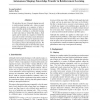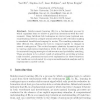86 search results - page 5 / 18 » Evolution of reward functions for reinforcement learning |
104
click to vote
ICML
2006
IEEE
16 years 2 months ago
2006
IEEE
We introduce the use of learned shaping rewards in reinforcement learning tasks, where an agent uses prior experience on a sequence of tasks to learn a portable predictor that est...
105
click to vote
ISCAS
2006
IEEE
15 years 7 months ago
2006
IEEE
— This paper describes a general approach for the unsupervised learning of behaviors in a behavior-based robot. The key idea is to formalize a behavior produced by a Motor Map dr...
111
click to vote
IWANN
1999
Springer
15 years 5 months ago
1999
Springer
To avoid the curse of dimensionality, function approximators are used in reinforcement learning to learn value functions for individual states. In order to make better use of comp...
124
click to vote
ECAL
2001
Springer
15 years 5 months ago
2001
Springer
Reinforcement learning (RL) is a fundamental process by which organisms learn to achieve a goal from interactions with the environment. Using Artificial Life techniques we derive ...
132
click to vote
NIPS
2001
15 years 2 months ago
2001
We consider the problem of learning to attain multiple goals in a dynamic environment, which is initially unknown. In addition, the environment may contain arbitrarily varying ele...


